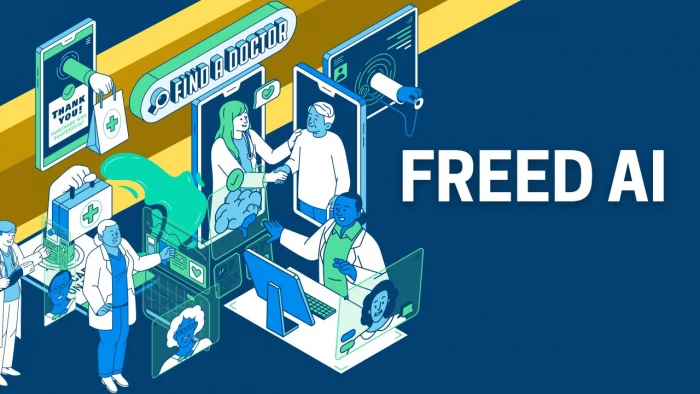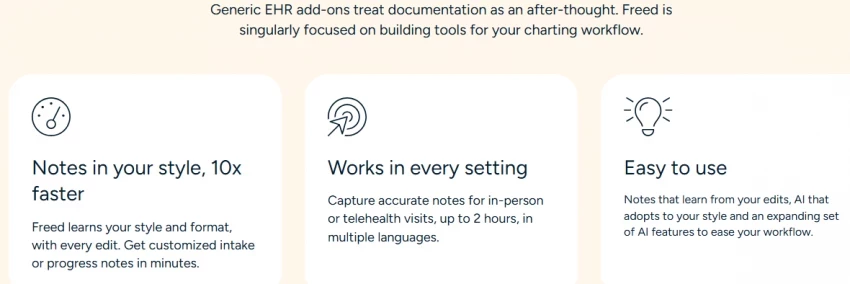

Freed AI review – an AI-powered medical scribe that helps me reduce burnout by automating transcription, SOAP notes, and specialty documentation like psychiatry.
As a clinician, I’ve felt the crushing weight of charting long after my last patient leaves. That’s why I turned to Freed AI, an AI-powered clinician’s assistant that takes over much of the documentation load. What impressed me most is that 20,000+ clinicians already use it, as reported by VentureBeat.
Instead of staying late to finish SOAP notes, I now leave on time and still know my records are accurate. But to really understand the impact, it helps to see where Freed fits inside daily clinical practice.
I think of Freed as my AI medical scribe—not just a recorder. Unlike older dictation tools, it doesn’t flood me with raw transcripts. Instead, it produces SOAP notes (Subjective, Objective, Assessment, Plan) that are already formatted for EMRs.
It works especially well in specialties such as psychiatry, where accurate and detailed notes matter. Instead of spending an extra hour rewriting patient conversations, I simply approve or tweak Freed’s draft.

Once I saw how naturally Freed fit into my workflow, I wanted to dive deeper into its actual features.
Here’s what stood out when I began using Freed day to day:
Each feature reduces friction in a small way, but together they transform my daily workflow. And that’s where user experience becomes critical.
When I first downloaded Freed, I was surprised at how quick the setup was. Unlike clunky software, it just worked. During visits, I simply let it run in the background. Afterward, I get a concise, structured SOAP note I can edit before signing.
The time savings are real—I’ve cut back nearly two hours of admin work daily, a figure echoed in Sequoia’s breakdown of Freed’s mission. That saved time changes how I show up for patients, but it also made me curious how Freed adapts in specific specialties like psychiatry.
Psychiatry documentation used to be one of my biggest stress points. Every session needed detailed SOAP notes that often stretched past midnight. With Freed’s psychiatry mode, I now generate complete mental health notes in real time.
I even came across a Reddit thread from therapists who had the same reaction: “holy, this saves hours.” That community validation reassured me that I wasn’t just imagining the difference. Still, I needed to compare Freed against other scribe tools.
I tried alternatives like Deepcura and even tested Lindy’s assistant model. Here’s the takeaway:
| Feature | Freed AI | Deepcura | Lindy |
| Primary Focus | AI medical scribe & SOAP notes | AI transcription scribe | General AI assistant (multi-domain) |
| Specialty Templates | Psychiatry, family medicine, therapy | Broad, less specialty-specific | Not tailored to healthcare |
| Deployment | Mobile apps + EMR export | Web + EMR integrations | Task automation agents |
| Funding & Adoption | $30M Series A, 20k clinicians | Earlier-stage adoption | Expanding outside medicine |
| HIPAA Compliance | Yes | Yes | Limited |
| Strengths | SOAP automation, specialty workflows | Accurate transcription | Flexible, general-purpose assistant |
| Limitations | Specialty gaps, AI reliance | Weak SOAP note automation | Not healthcare-native |
As Deepcura’s own comparison points out, Freed’s SOAP-first design makes it stand out. Once I understood its edge, I wanted to know more about its growth story.
Freed isn’t just a niche startup anymore. In 2025, CNBC announced a $30M Series A led by Sequoia Capital, and BusinessWire confirmed that the funding was aimed at reducing clinician burnout.
With more than 20,000 clinicians already on board, I see Freed less as an experiment and more as an industry trend. That said, user feedback is never one-sided—so I dug into the pros and cons.
Pros I’ve seen (and heard from colleagues):
Cons worth noting:
Reviews like Fritz AI’s writeup echo this: Freed saves time but isn’t a one-size-fits-all solution. To me, that raises important questions about ethics and safety.
In healthcare, AI is only as safe as its oversight. Freed reassures me with HIPAA compliance, strong encryption, and clinician control over every note. But no AI can replace human judgment, and relying too much on automation could risk errors slipping into records.
This balance between speed and oversight is key, and it ties directly into how clinicians implement Freed in their workflows.
Here’s how I integrated Freed without disrupting my clinic:
This phased approach made Freed stick, and it made me excited about what’s next on their roadmap.
With its Sequoia-backed funding, Freed is positioned to expand. I expect it to broaden specialty coverage beyond psychiatry, deepen EMR integrations, and maybe even bring decision-support into transcription.
Its adoption in the U.S. is strong, but scaling globally could mark its next frontier. That leads me to my final take on whether it’s worth it today.
For me, Freed AI isn’t just another dictation app—it’s a specialized assistant that truly reduces burnout. If you’re in psychiatry, therapy, or family practice, the value is immediate. If you’re in highly complex specialties, it might be best as a supplement rather than a replacement.
Either way, it helps me leave work on time—and that’s a verdict most clinicians will appreciate.
Is Freed AI HIPAA compliant?
Yes, Freed follows HIPAA standards to protect patient data.
Which specialties does it support?
Psychiatry, therapy, family medicine, with more specialties on the roadmap.
Does Freed integrate with EMRs?
Yes, it exports SOAP notes for EMRs, though integration depth varies.
How accurate is it?
Accuracy is high for routine visits, but complex cases may need clinician edits.
Is it free to use?
There’s a trial, but full access requires a paid subscription.
Can Freed replace a human scribe?
It can for many clinics, but clinician oversight is still required.
Be the first to post comment!